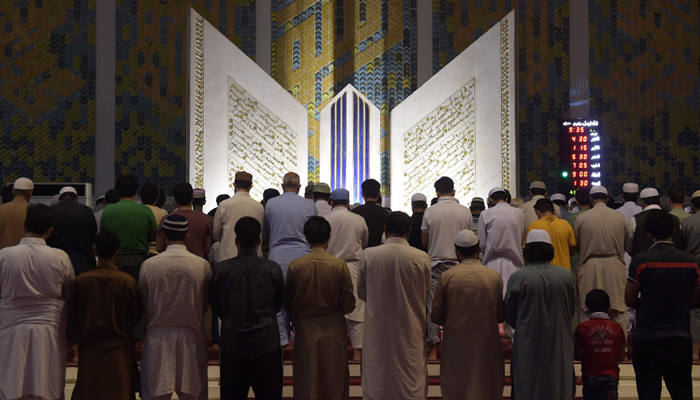President Alvi says 'conditional permission' given for congregations, urges people to pray at home
President reminds people that if precautions are not taken, the government will review the decision to allow taraweeh
ISLAMABAD: President Arif Alvi on Thursday explained the conditions under which congregational prayers have been allowed in mosques after a 20-point agreement was reached between the ulema and the government.
In a tweet, President Alvi said: "All those concerned about the SOPs regarding prayers in mosques and responsibilities of implementation [...] please read the following."
The handout in the tweet read that there were varied opinions regarding extent of lockdowns throughout the world. "However the 'Ijma' of the ulema with the Government/s in Pakistan needs elaboration, explanation and clarity."
The notice says that whereas the ulema have fully entrusted the provincial governments to implement their lockdowns or decide on conditions under which prayers will be held in mosques, people are nonetheless reminded that they are urged "to pray at home".
The following points have been detailed by President Alvi in his note:
1. The first 17 points very clearly define the health-safety conditions that need to be followed for prayers in mosques. These are universal precautions that are agreed upon throughout the world and form the basis of functioning of any facility, factory, and any public or private interaction between people.
2. The questions (and debates) on the opening of any congregational activity, is of implementation of these COVID-19 specific standards. The burden of implementation of the 17 points under which only 'conditional' permission for prayers has been agreed upon, is a shared responsibility between the Imams of the mosques, community people, District Government, and Provincial Government, is elaborated by Point # 18 which states that: "Mosque committees should be in constant contact with the district and provincial governments and police and cooperate with them."
3. Under Point # 19, it is clearly stated that only conditional permission for prayers is being granted, if health-safety conditions as elaborated in points 1 to 17 are followed: "Mosques committees are allowed to conduct taraweeh under these SOPs."
4. At any time if it is felt by any government whether Federal or Provincial that the SOPs are not being followed or the situation of Coronavirus is getting bad or will get bad, it may change its policy, and by this agreement the onus to take such decisions which the ulema will support lies with the government/s. As Point if 20 clearly states: "If during Ramazan, government authorities feel that the situation has got out of control and the number of cases surge, the authorities can review the decisions taken."
The statement said that the provincial governments were completely entrusted by ulema to implement lockdown and if the situation worsens they can limit the prayers as well.
20-point agreement
The following are the 20 points agreed upon during the meeting held last week between President Alvi and ulema:
1. No carpets or dariyaan (mats) to be laid down in mosques because the virus is airborne. Clean floors for prayers must be ensured.
2. If people want to bring prayer mats from home they may do so.
3. No gatherings after namaz/tarawih will be permitted.
4. If a mosque has an open area/garden it is preferable to conduct prayers there.
5. People over 50 years of age, children should not be allowed in mosques.
6. Everyone must follow the instructions of social distancing by WHO and other health experts.
7. Tarawih should not be conducted on roads, footpaths and anywhere else than the mosque premises.
8. People should continue to keep observing regular prayers at home.
9. Masjid, Imambargah floors should be washed with chlorinated water regularly.
10. There should be a six-feet distance during congregational prayers/
11. The mosque should form committees to ensure that people are abiding by the rules and decided SOPs.
12. Markers should be made on the floors of mosques and Imambargahs to guide people about the distance they should keep from others.
13. People should do ablution at home.
14. People must wear face masks when coming to mosques and maintain physical distance.
15. People must avoid handshakes.
16. Itikaf must be observed at home.
17. No one must prepare or hold Sehri and Iftaar in mosques.
18. Mosque committees should be in constant contact with the provincial government.
19. Mosques committees are allowed to conduct tarawih under these SOPs.
20. If during Ramazan, government authorities feel that the situation has got out of control and the number of cases surge, the authorities can review the decisions taken.
-
Security forces gun down 30 terrorists in multiple IBOs in KP: ISPR
-
MQM-P calls for new province in Sindh
-
US report validates Pakistan military edge over India: PM
-
Banned TTP poses serious threat to Pakistan security: UNSC panel
-
CM Afridi clarifies remarks on by-poll after ECP requests army deployment
-
Dubai sees 3.2m Pakistani passengers in 2025 as airport sets new milestone
-
Security forces kill 23 Indian proxy terrorists in KP's Kurram
-
Pakistan to construct island to boost oil exploration: report












